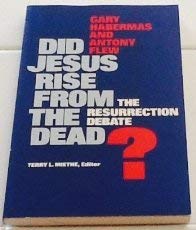Did Jesus Rise from the Dead? the Resurrection Debate
Select Format
Select Condition 
Book Overview
[This] is the most important question regarding the claims of the Christian faith. Certainly no question in modern religious history demands more attention or interest, as witnessed by the vast body... This description may be from another edition of this product.
Format:Paperback
Language:English
ISBN:0060635525
ISBN13:9780060635527
Release Date:January 1990
Publisher:HarperCollins Publishers
Length:190 Pages
Weight:0.49 lbs.
Dimensions:0.4" x 5.3" x 7.9"
Related Subjects
Christian Books & Bibles Jesus Religion Religion & Spirituality Religious Studies TheologyCustomer Reviews
4 ratings
Addedum to previous reviews: Flew is no longer an atheist
Published by Thriftbooks.com User , 15 years ago
Flew's works--and his atheism--were standard fare thirty years ago when I began my philosophical studies. Imagine my surprise, then, when I came across Prof. Flew's latest book: There Is a God: How the World's Most Notorious Atheist Changed His Mind. The book even concludes with a dialogue with Anglican bishop and prominent New Testament scholar N. T. Wright. While Flew does not say he has converted to Christianity, his "conversion" to theism is nonetheless remarkable. Just thought prospective readers might be interested.
Flew the Skeptic Won
Published by Thriftbooks.com User , 17 years ago
This seems to me a fairly good book. It is one of the few books on the reputed bodily resurrection of Jesus that takes the debate form, and much is gained by that format, as both sides are heard, questioning each other closely. Flew and Habermas are both diplomatic, though Habermas is more combative, while Flew is funnier. Personally, I think Flew, the skeptic, won the debate, though he was no real expert on the subject. His common sense prevailed, despite his having perhaps been "set up" by the Christian organizers of the debate, who arranged for it to take place only two brief months after first approaching him with the idea. Early on, the two debaters discuss the theoretical possibility of miracles. They agree that miracles are not possible in a closed naturalistic world order, but that if a supernatural power exists such miracles are indeed possible. However, Flew rightly insists that the evidence for any such miracles should be very strong before we accept it, considering that religious minds are excitable and prone to fantasy. Unfortunately, neither of the two debaters mentions the fact that reported miracles have become far fewer in the centuries since modern science arose, which seems to me a very strong argument against the reality of those many miracles reported in ancient times, including a bodily resurrection of Jesus. Habermas touts the reputed miracles of the mortal Jesus as evidence for his divinity and, by extension, his resurrection. Flew, however, notes the hard truth that the earliest documents of the New Testament (the 21 epistles or letters) never mention even a single miracle by Jesus performed during his lifetime. Read James, for example, or Hebrews, or all the letters of Paul. You'll find no mention of miracles by Jesus. Habermas, the resurrection expert, repeatedly emphasizes the resurrection "creed" contained in Paul's I Corinthians 15:3-7 as evidence for a bodily resurrection of Jesus, insisting that, though written c. A.D. 55, it goes back to the earliest few years of Christianity, the early 30s. But Flew has good objections here, observing that we have only Paul's version, written down long after the events in question, and perhaps inexactly. Flew also notes that, although the "creed" (which is never actually called a creed by Paul) first says that a risen Jesus "appeared to Cephas" (Peter), we have absolutely no description anywhere of this "appearance," a very strange fact considering that it was the first one ever recorded. Did Peter tell no details of that appearance to anyone? Why not? Was it merely a subjective vision? It would seem so. Even the epistles I and II Peter offer no description of any resurrection appearance of Jesus. Paul's "creed" then says that a risen Jesus "appeared to the twelve," but, as Flew notes, this alleged group appearance could actually have been several separate "appearances," that is, individual visions, each entirely subjective though similar in content. I might
Brilliant!
Published by Thriftbooks.com User , 22 years ago
This book is one of the most entertaining and thought-provoking I've ever read! It is the published form of a 1985 debate between Christian evidentialist apologist Gary Habermas and atheistic philosopher Antony G.N. Flew concerning the question, "Did Jesus rise from the dead?" The question was limited to historicity of the resurrection of Jesus Christ - other topics, such as the existence of God and the verifiability of miracles, were off limits. After each debater gave an opening statement, a rebuttal, and the two went "head-to-head", the judges voted 7-2 (one draw) in favor of Habermas as winner of the debate.This book is incredibly interesting. Part One is the formal debate, as described above. Part Two is a transcript of the discussion between Flew, Habermas, Terry L. Miethe, and W. David Beck that took place the night after the debate. Part Three consists of responses to the debate by Wolfhart Pannenberg, Charles Hartshorne, and J.I. Packer. Part Four is a final response by Habermas to the issue of the resurrection.No matter what your religious or philosophical background, if you are interested at all in whether or not it is reasonable to believe in the miraculous, particularly in the Christian claim that Jesus Christ rose from the dead, this book will fascinate you. Enjoy!
Flew was Killed
Published by Thriftbooks.com User , 22 years ago
That says enough. Read it for yourself and tell me who you thought the winner was. I almost felt sorry for Flew.






